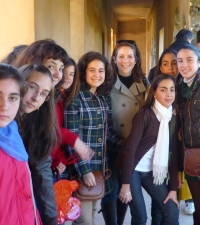Teaching Jobs

There’s no sense in sugarcoating it: the labor situation in Spain is grim, with news of unemployment figures and government spending cuts making headlines daily. For people considering moving to Spain, the job market is a vicious place. Still, expats can expect to find a wealth of jobs related to the service and education sectors.
Due to increased demands for linguistic knowledge, native English speakers can find an array of jobs related to teaching. These programs typically provide help with a visa, making the process of coming to Spain slightly easier. Be aware that these jobs are usually part-time, low-paying and without social security benefits, and are not permanent.
Ministry of Education Language Assistant Program
Many young people come to Spain to work as assistant teachers, known as auxiliaries de conversación. This government-sponsored program provides minimal training and placements all over Spain in primary, secondary or language school settings. The pay is dismal – between 700€ and 1050€, depending on the region – and one can expect to work 12-16 hours a week from October – May. The program provides a student visa and private health insurance. Several complaints have risen in the last few years about the inability to be paid on time and the lack of organization within the schools, but it is popular and provides around 2,000 positions each school year (this number is set to change for the 2012-13 school year due to budget cuts). Similar programs exist through the British Council for UK applicants.
To apply for this position, you’ll need to follow the instructions on the website, uploading your data and CV to an internal platform within the Ministry of Education called Profex. The application deadline is typically March 31.
Program website: http://educacion.gob.es/eeuu/convocatorias-programas/convocatorias-eeuu/auxiliaries-conversacion-eeuu.html
BEDA
BEDA is similar to the language assistant program, with placements in Catholic schools sponsored by the government, called concertados, in the Madrid community, with scattered placements in Castilla La Mancha and Murcia. Like the Ministry of Education program, those hired can expect to give classes in a primary or secondary school with 16-24 hours of work a week, plus planning time. A student visa and private health insurance will cover your stay in Spain, but you’re also expected to enroll in a teaching skills course at the University of Comillas. Pay is between 700€ and 1040€ a month, depending on number of hours dedicated to the school. While there is no set limit of years, pay does increase with experience in the program.
The application process, which ends in late March, is straightforward: you must send your resume and a letter of intent to the program coordinator, who will then arrange for a phone or Skype interview. You can get in touch with her at Samantha@ferececa.es .
UCATEM
The aim of UCATEM’s bilingual assistantship is to provide students with communication tools in English and to increase their opportunities in the future. Like the BEDA program, selected assistants will work in classrooms in Madrid or the surrounding area for either 18 (just under 1000€) or 25 hours (1440€) a week. The program provides a student visa and the option to renew for a second year. Job duties will vary depending on the school and age group, but will likely be preparing and giving English classes, leading conversations groups and teaching non-linguistic areas, such as art or science. Participants are responsible for the planning and content of their lessons, but have the benefit of not being alone in class.
To apply for this position, you’ll need to send your CV to assistant coordinator Alana Meek at Alana@ucetampbu.es . If pre-selected, you’ll receive a packet that includes a questionnaire, letter of recommendation and an application for employment. Once selected, you’ll do a final-round interview.
Contact is Jose Manuel Caballero de Zulueta at bicucetam@ucetam.es , and more details can be found at http://ucetampbu.es .
Language Academies
Perhaps the most difficult job to come by in Spain is at a language academy, which is a business directed at teaching English or other languages in a classroom setting after work and school hours. Academies require that you have permission to work in the European Union and will require a face-to-face interview, and travel expenses for the interview are not reimbursed. Every academy is different, but expect to earn between 9€ and 15€ an hour, plus health benefits, and to work from mid-September until mid-June in the afternoons and evenings. If you’re willing to be flexible and organized, it can be a good way to make money and receive health care. The best way to search is through Google or ESL job boards, like goabroad.com or Dave’s ESL Café.
Regardless, teaching in Spain can be an interesting way to get to know the country, and more and more people are choosing to take a break and take a classroom job. For more information about these programs and the experience that goes along with them, visit the program website.
By Cat Gaa, who left her native Chicago five years ago to live in the olive groves of Andalusia. Residing in Seville, she has worked for the Language Assistant program, a summer camp and now teaches first grade at a private school, but all she wants to really do is write.
- My Life Abroad -
A selection of expat stories

"A fun compulsive read!"
J. Matcham, Amazon
"I strongly advise people ready to live abroad to read this book!"
Patrice, Amazon

 Wages and Benefits in Spain
Wages and Benefits in Spain Entrepreneurship for the Trailing Spouse
Entrepreneurship for the Trailing Spouse Guide to Finding a Job Abroad
Guide to Finding a Job Abroad
 AGS Worldwide Movers
AGS Worldwide Movers Fexco payment solutions
Fexco payment solutions 1stMove Car Shipping
1stMove Car Shipping Embassies and Consulates in Spain
Embassies and Consulates in Spain Why using an alternative broker for large money transfers
Why using an alternative broker for large money transfers